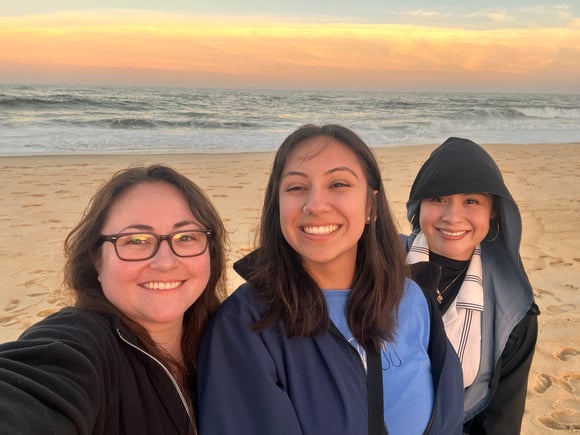Funding from the Department of Otolaryngology – Head & Neck Surgery at the University of Colorado School of Medicine is helping Jasmine Ramirez, a third-year doctorate of audiology student at CU Boulder, pursue her passion for helping medically underserved communities.
Ramirez is the first recipient of the Richard D. Wyant Endowed Award in Audiology, a grant endowed by a former otolaryngology patient and matched with funds from the department. Ramirez used the award to research over-the-counter hearing aids, which the FDA made available in 2022 to increase access to the devices.
“You can buy them over the counter at places like Walgreens and Walmart, but many individuals are still very confused about what they are and what they do and if they help,” Ramirez says. “For my capstone project, I researched over-the-counter hearing aids and made a free handout for the community to say, ‘This is what over-the-counter hearing aids are; here are the differences between an over-the-counter hearing aid versus a prescription hearing aid.’ We're going to translate it into Spanish so it can help in those communities as well.”
Challenges overcome
Vinaya Manchaiah, AuD, PhD, Ramirez’s mentor at the CU School of Medicine, says Ramirez, who is Mexican-American, was the ideal applicant for the award, which was designed for students from underrepresented populations who have overcome adversity in their health professions careers.
“She's a highly motivated student who is always keen to learn, and she's also very keen to work on diversity-related initiatives,” Manchaiah says. “She wrote a wonderful application, sharing her background and the challenges that she went through and how she was able to overcome them and succeed in a doctorate program. We have six people on the award committee, and everybody thought she was the best applicant.”
Field of possibilities
Ramirez, who came to the audiology program at CU Boulder after studying communicative disorders at California State University, Fresno, first found out about the field from her mother, a longtime medical assistant to an ear, nose, and throat doctor in California. Ramirez took one audiology course during college and fell in love with the specialty for its variety and its ability to help people from different age groups.

Ramirez, center, with her family.
“I had a rotation at a hospital doing newborn hearing screenings, and I’ve worked with people all the way up to 90 years old,” she says. “We work with hearing and amplification devices, including cochlear implants, FM systems, and hearing aids. We do interoperative monitoring, which involves going into surgeries with surgeons to monitor the patient’s neurological responses, and we do so much more.”
Ramirez currently works part time at the Rocky Mountain Regional VA Medical Center on the Anschutz Medical Campus, helping veterans with issues including hearing loss and tinnitus.
Focus on diversity
Ramirez says she is grateful to Wyant for creating the grant — not just for the funds it provides, but for what the gesture means to her as a person of color in a field where many practitioners are white.
“He had a great experience with audiology, so he wanted to create a scholarship for people from underrepresented communities to help them through school and help them go through the process of being an audiologist,” she says. “The field of audiology is around 85% women, which is amazing, but there's a large percentage, well over half, that are white. I wanted to represent underrepresented communities. In my essay, I touched on how people of color don't have as much access to higher education.”
Ramirez will complete her third year in the audiology program in spring 2023; she will spend her fourth year in an externship learning practical skills and preparing to launch her career in the field. When she takes that step, she says, it’s important for her to stay connected with communities of color.
“I really like the VA, and I would highly consider going to another VA after I graduate, but I also like a medical setting like Anschutz, where it's extremely diverse,” she says. “I love the variety. I also want to keep working with underserved communities, because it is a need in audiology. A lot of research around hearing loss focuses on the white population, so I would love to have these communities represented in the research and give them any kind of help and service that I can.”



